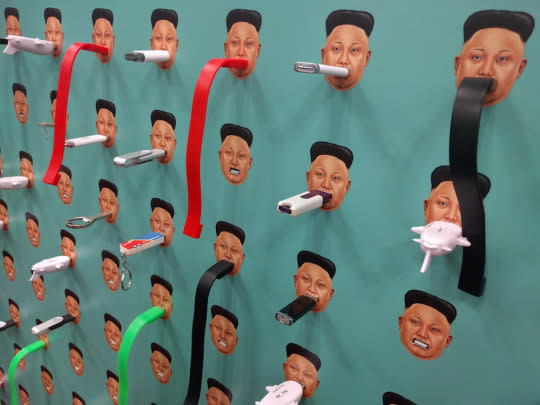New use for old flash drives: Subverting the regime in North Korea

I may have finally found a use for the USB flash drives piling up on my desk: I could send them all to the worst country in the world.
I found out about this solution at the South by Southwest festival (SXSW) earlier this month, where a booth on the trade-show floor featured a board covered with cartoonish drawings of North Korean dictator Kim Jong Un. On a closer inspection of the Flash Drives for Freedom booth, I realized that each of these drawings included a slot — in the young dictator’s mouth — where visitors could stuff a flash drive.
Thinking of the inscription at the Jefferson Memorial — “I have sworn upon the altar of God eternal hostility against every form of tyranny over the mind of man” — I grabbed a flash drive from my bag (I’d picked it up at some press event) and popped it in.
The idea
North Korea (officially known as the Democratic People’s Republic of Korea, or DPRK) has owned the title of “Most Worthless Government on Earth” for decades. It owes that title to many things; one of them is its monopoly on the information to which its citizens have access. (Others include things like imprisoning and executing dissidents.)
South Koreans and North Korean refugees have long tried to undermine that monopoly by smuggling media into the country. The DPRK’s halting steps towards making its economy less dysfunctional have put more computers into circulation and made that task slightly easier.
The Human Rights Foundation, a New York nonprofit, and Forum 280, a Bay Area civic-engagement group, launched Flash Drives for Freedom in February to continue that dissemination of information. Its goal is to collect flash drives, fill them with Korean-language media, then have them smuggled into North Korea.
Alex Gladstein, chief strategy officer at HRF, estimated that fewer than 7,500 flash drives made their way to the DPRK in 2015. He said that 25,000 now seems a plausible goal for this year.
What kind of media goes on them? North Korean defectors in the south decide, but Gladstein said their contents often include things like a complete download of the Korean-language Wikipedia, e-books, newspapers, pop songs and soap operas.
Volunteers then find ways to get the drives across the DPRK border. (At SXSW, HRF staffers suggested typical bribes for border guards would be $50, a carton of cigarettes or a bottle of booze). From then on, the drives enter what passes for an open market in the north.
Gladstein told me by email that, “According to defectors, one flash drive filled with foreign content can fetch the same price as a month’s worth of food for a family of four.”
Will it work?
Undermining North Korea’s tyrannical government is harder than toppling the Soviet Union, and it’s easy to see a project based on recycling e-junk as little more than high-minded slacktivism.
It’s true that Flash Drives for Freedom demands nothing more than putting a drive or two in the mail (Flash Drives For Freedom, c/o Appbackr Inc., 2251 Yale St., Palo Alto CA 94306). But two experts on Korea endorsed it as a worthwhile strategy.
“I think it could be effective,” said Victor Cha, director of Asian studies at Georgetown University’s School of Foreign Service. “There is an unquenchable thirst for flash drives and information about the outside world in North Korean society, which unlike the government, has become quietly more open with the growth of market-oriented activities, both black market and official, inside of the country.”
Cha — also a former George W. Bush National Security Council staffer and author of “The Impossible State: North Korea, Past and Future” — suggested that government policy should head in the same direction.
“The North Korean Human Rights Act in Congress will be up for renewal next year, and I think there will be more resources devoted specifically to the issue of providing more information to the North Korean people,” he said.
Arnold Fang, East Asia researcher for Amnesty International, supported the overriding aim of this project.
“We believe that every North Korean has the right to seek and receive information freely, including information from outside the country,” he wrote in an email. “It is also important for them to be able to connect with their families and friends.”
Fang, however, was not so sure that this effort would hasten Kim’s downfall: “Whether people will act, or are able to act, differently after receiving outside information is yet another issue.”
Email Rob at rob@robpegoraro.com; follow him on Twitter at @robpegoraro.

